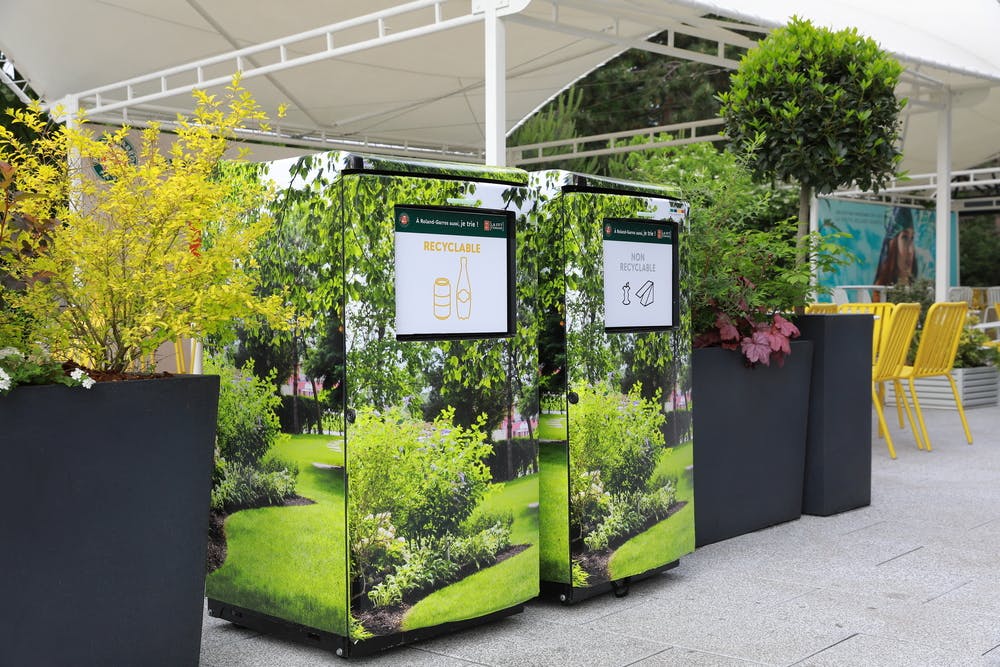The FFT continues to show its commitment in different ways throughout the tournament:
Throughout the fortnight, Roland-Garros is running an awareness campaign for the general public with videos, shown in the complex’s walkways, starring the players themselves. The green teams will be circulating around the stadium to raise spectator awareness with regard to eco-friendly behaviour and sustainable development in general, by demonstrating the key actions undertaken. Using the tablets they carry around with them, visitors can take part in an eco-responsibility quiz, with tickets to the 2020 tournament up for grabs.
Sustainable food choices
In partnership with Yann Arthus-Bertrand’s Goodplanet foundation, the FFT is working with all the tournament’s restaurants and catering services on a sustainable three-year food plan designed to offer all those present at the tournament products that are more environmentally friendly than ever and which provide a necessary response to climate issues: certified, seasonal produce originating from short supply chains, etc.
Fighting food wastage
Since 2014, the FFT has organised an operation to fight food wastage, in collaboration with Le Chaînon Manquant charity. Any unconsumed foodstuffs are redistributed to various Parisian associations to help vulnerable people. This operation could not exist without the involvement of the tournament caterers, Potel et Chabot and Paris Society, and restaurateur Sodexo.
Lighter transport footprint
- In 2018, 72.2% of spectators (54.9% in 2011) travelled to the stadium using transport that emitted little or no greenhouse gases: 60.6% used public transport and 11.6% travelled on foot or by bicycle. However, 21.1% travelled in their own car (with an average of 2.85 passengers per car) and 6.7% used transport such as taxis or chauffeur-driven vehicles.
- Two electric mini-buses (22 seats) run a shuttle service between the Pelouse de Saint-Cloud car park and the Porte d’Auteuil.
- Roland-Garros has made a carpooling website available to everyone coming to the tournament: www.covoiturage.fft.fr puts drivers in contact with passengers.
Waste reduction and recycling
An efficient waste separation system is being implemented during the tournament, with 13 waste streams brought to sorting and treatment centres. In 2018, 45% of tournament waste was recycled.
Reusable cups: Eco-cups have replaced disposable cups. They require a €1 deposit and are offered to all spectators for coffee, cold drinks, wine and even champagne. Each year, they reduce the amount of cardboard required by the tournament by around two tonnes of non-recyclable cups.
Bio-waste: A bio-waste (food and organic waste) management system is now used in all the organisation, media and player restaurants, as well as in the new Village. More than 45 tonnes of bio-waste were recycled in the form of worm compost after the 2018 tournament. In the space of five years, the amount of bio-waste collected at Roland-Garros has increased nearly 20-fold, from 2.6 tonnes in 2014 to 45.5 in 2018.
Non-recyclable waste generates biogas, which is captured and used to produce electricity that can be directly injected into the grid. This biogas is also used as fuel for waste collection trucks. This is a first in the Paris region, and the French Tennis Service benefits from this service.
Energy
ENGIE: 100% renewable energy at Roland-Garros
Since April 2016, the FFT has had an electricity supply contract for all of its sites (the National Training Centre, Jean-Bouin courts and Roland-Garros) with Engie, using 100% renewable energy.
This year, in addition to some of the mobile phone charging stations being powered by conventional solar panels, the FFT and ENGIE are trialling the use of innovative flexible green solar panels in two areas of the stadium complex. The aim is for them to be used more widely across the complex in the future.
 ROLAND-GARROS
19 May - 8 June 2025
ROLAND-GARROS
19 May - 8 June 2025



 © Cedric Lecocq / FFT
© Cedric Lecocq / FFT